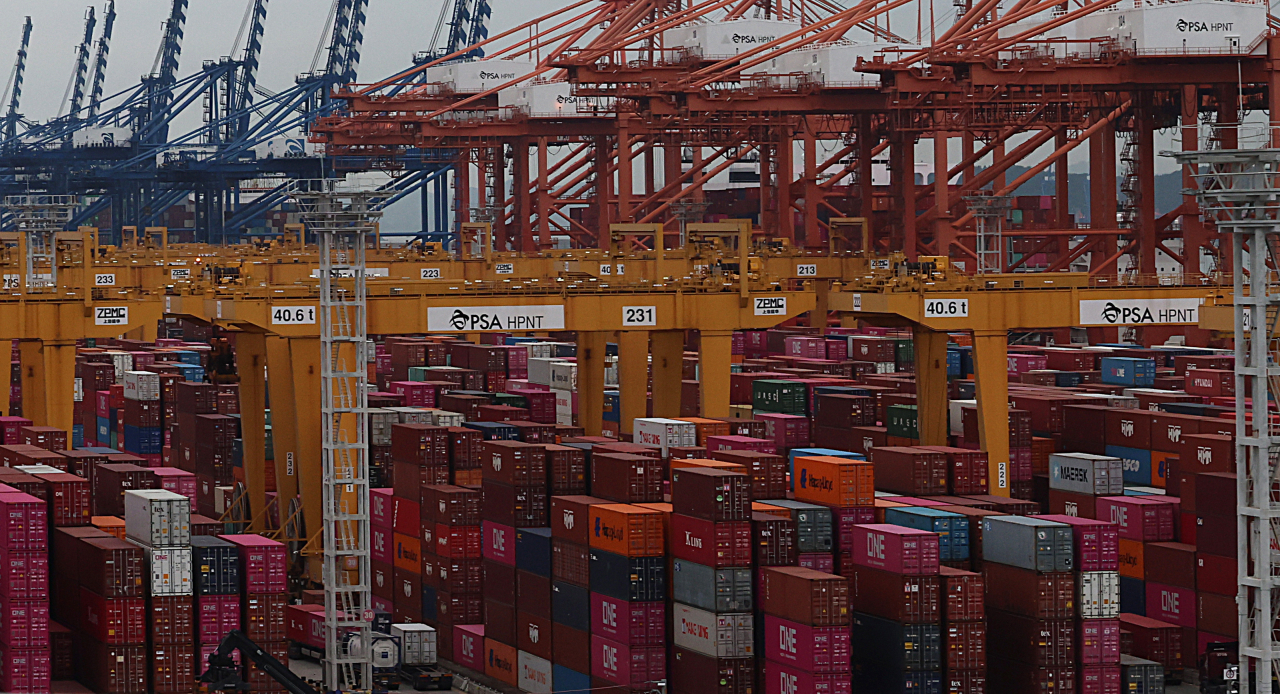Korea downplays impact of US investment ban on Chinese tech

Shipping containers are stacked at a port in Busan. (Yonhap)
Korean authorities expect the United States’ decision to ban outbound investments in artificial intelligence and other technology sectors in China to have a limited impact on South Korea's economy.
On Monday, the Biden administration said it finalized rules that will bar US funds from flowing into Chinese technology such as quantum information technologies, AI systems and advanced microelectronics due to national security concerns.
The new rules, directed by an executive order signed by US President Joe Biden in August 2023, will take effect Jan. 2.
“Considering those obligated to comply and those subject to investment restrictions, the direct impact on our economy is expected to be limited,” Korea’s Ministry of Trade, Industry and Energy said in a statement Tuesday.
According to the US Treasury Department, US investors will be required to inform authorities about investments in some less advanced technologies such as legacy chips.
The measure is expected to hamper US institutional and retail investors’ capital allocation to Chinese companies like Semiconductor Manufacturing International Corporation, a partially state-owned semiconductor foundry firm, and on shares and bonds tied to Chinese high-tech companies.
“According to the US Treasury Department's administrative rules, those required to comply are US nationals or US corporations, and the only country listed as a country of concern to date is China (including Hong Kong and Macau),” the Korean ministry said.
“The government plans to closely communicate with domestic industries and experts to analyze the future impact on our economy from various angles and actively seek response measures.”
The new regulation is part of the US push for an upper hand in the extending technology war with China. By putting roadblocks against the Asian country’s tech development, it can prevent it from taking a dominant position in the global market.
Treasury Assistant Secretary for Investment Security Paul Rosen said AI, semiconductors and quantum technologies are “fundamental to the development of the next generation of military, surveillance, intelligence and certain cybersecurity applications.”
"This final rule takes targeted and concrete measures to ensure that US investment is not exploited to advance the development of key technologies by those who may use them to threaten our national security," he added.
Korea has come under pressure as the Biden administration exerted a series of new regulations on China combined with mounting uncertainties surrounding the US presidential elections, slated for Nov. 5.
According to news reports Tuesday, a group of global automakers operating in the US requested the US government delay the implementation of regulations on connected vehicles produced by China and Russia.
Korean carmaker Hyundai is a member of the Alliance for Automotive Innovation, a Washington-based trade association and lobby group.
The broad scope of the term “connected vehicles” -- covering any car with navigation or wireless software that communicates with systems outside of the car -- could bring many China-sourced components used in Korean vehicles, such as telematics control units and wireless communication modules, under the purview of the new US regulations.
The tariff policy that the next US president will map out is another concern for Korean companies.
According to Korea Chamber of Commerce and Industry polls last week, over a quarter of Korean companies said Republican presidential candidate Donald Trump's plan of “expanding universal and reciprocal tariffs” caught their attention the most among his proposed economic policies.
The International Monetary Fund also warned in its Oct. 22 publication that Trump's planned tariffs could hurt global growth.
The organization said the size of the global economy could fall by 0.8 percent point next year because of high-rate tariffs among major trading blacks.
Trump has called for a 10 to 20 percent tariff on all US imports, and a higher rate of 60 percent or more on those from China.
By Park Han-na (hnpark@heraldcorp.com)
EDITOR'S PICKS
- Busan adding longer-haul flights with Bali route to start Wednesday
- AmCham, KITA host seminar on doing business in US
- [KH Explains] How LG Energy Solution’s bold bet paid off with Tesla, Mercedes deals
- Seminar stresses arbitration's role in ending private equity disputes
- Hyundai, rival carmakers urge US to delay Chinese tech ban
- Hanon Systems to build 1st electric compressor plant in North America
- Hankook Tire uses carbon black for sustainable production
- Asia-Pacific tax chiefs gather in Seoul to bolster cooperation








![[KH Explains] How LG Energy Solution’s bold bet paid off with Tesla, Mercedes deals](http://res.heraldm.com/phpwas/restmb_idxmake.php?idx=141&simg=/content/image/2024/10/29/20241029050614_0.jpg)






